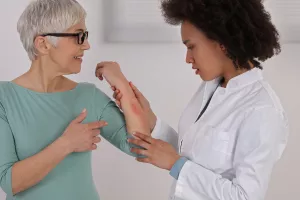Hives are a common skin outbreak that many people experience. In fact, 10–15% of the population will deal with hives at some point in their lives. Fortunately, our Tufts Medicine team can get you the treatment you need to thrive without hives.
Hives are brought on by unique triggers
When your body comes into contact with an allergen it doesn’t like — such as certain foods, medications or insect stings — hives can pop up across your body. Hives are irritating little lesions that can lead to symptoms like:
- Itchy skin
- Nausea
- Shortness of breath
- Swelling
The tricky thing about hives is that they can sometimes change shape, color and size over the course of several days. The key to a healthy and successful treatment for hives is first pinpointing your unique allergy trigger.

Conditions
If you're experiencing shortness of breath that doesn't go away quickly, contact a medical professional or call 911 right away.
Hives may look most familiar to you as small, itchy and red lesions. Other times, hives can produce what we call a “wheal and flare” response — a raised, pale swelling 1/8–2 inches in diameter surrounded by a red flare.
Symptoms for hives by body part:
- Thick areas of skin: Hives can develop on the palms of the hands, soles of the feet or scalp as itchy and even painful lesions with less defined swelling.
- Soft areas of skin: Hives can appear around the eyes and mouth or on the genitalia as angioedema, also known as swelling beneath the skin.
Tongue and back of the throat: Hives can be painful welts accompanied by shortness of breath. - In the stomach: While it’s rare to get hives in your stomach, symptoms can include nausea, cramps and diarrhea.
Day-to-day activities, items we touch and even stress can all lead to hives. These are known as aggravating factors. This could look like hives brought on by taking a shower or doing strenuous exercise. Alternatively, hives could appear along pressure points, like where your belt sits along your waist.
Contact dermatitis is hives that develop within minutes on the body part that comes in direct contact with an allergen, like touching grass with your feet or animal hair with your hands.
Hives caused by exercise are unusual, but it can lead to a serious allergic reaction called anaphylaxis. It’s important to note that exercise can also aggravate other forms of hives.
If you're going through anaphylaxis, contact a medical professional or call 911 right away.
Hives caused by eating food usually appear in less than 1 hour. Common foods that cause hives include:
- Fresh fruits
- Fresh vegetables
- Peanuts
- Seafood
- Tree nuts
Hives caused by an insect sting will appear within 30 minutes.
Hives caused by medications can be very severe and pop up quickly after ingesting or injecting a medication. For first-time drug users, hives may not appear for up to 10–14 days. This delay in hives is called primary sensitization.
As a general rule, if you’ve been taking a drug for more than 2 months, it’s unlikely that it’s the cause of your hives. Contact your doctor or the person who prescribed the medication if you have any questions.
Physical stimuli, such as ultraviolet light, skin vibration or exposure to the cold can cause hives in some people.
Testing
During your evaluation, your doctor may perform several diagnostics:
- Blood test, if your hives have been present for several months
- Physical examination
- Skin biopsy (this is rare)
- Skin test
Treatments
Hives are often treated with antihistamines and by distancing yourself from the allergen. Sometimes we'll test a combination of medications until we find the treatment that works best for you.
For more severe hives, your doctor may prescribe cortisone pills or other kinds of medications that suppress the immune system. If your mouth or throat is prone to swelling, you may be prescribed an adrenaline injector for emergency use.
Keep in mind that these medications may not be able to completely get rid of your hives. Instead, they make your symptoms and hives more manageable.
FAQs
Topical creams are rarely effective in treating hives because hives run deeper in the skin than the topical medication can reach.
Alcohol-based creams may have a temporary effect in reducing itching, but the effect is too short-lived to be useful.

From regular office visits to inpatient stays, find the healthcare you need and deserve close to home.

Meet the doctors and care team devoted to supporting you every step of the way along your path to better health.